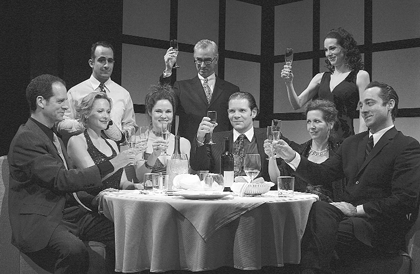Atlantic Theater takes up an early work and one very recent
I will show you fear in a handful of dust.
—Eliot, “The Waste Land,” 1922
In a handful of dust, or an old rocking chair. Rose and Bert Hudd are at home in their room on an upper floor of a large house somewhere in England. He sits at a table, reading a magazine, saying nothing, nothing, nothing. She chatters away, serves him food and tea, chatters, chatters, sits in the rocking chair, gets up. There is a knock on the door.
Enter Mr. Kidd, the landlord. Maybe the landlord. A brusk yet talkative type. Says he’s been looking at the pipes. Looks around the room. Says: “Eh, have I seen that before?”
ROSE: What?
MR. KIDD: That chair.
ROSE: I don’t know. Have you?
MR. KIDD: I seem to have some remembrance.
ROSE: It’s just an old rocking chair.
MR. KIDD: Was it here when you came?
ROSE: No, I brought it myself.
MR. KIDD: I could swear blind I’ve seen that before.
ROSE: Perhaps you have.
MR. KIDD: What?
ROSE: I say, perhaps you have.
MR. KIDD: Yes, maybe I have.
If by now you are not feeling very uneasy, you will as soon as silent Bert gets up, silent, puts on cap and scarf, silent, and goes out in the night, silent, to drive his van who knows where or why. Or when two other people turn up at the door, looking for a vacant room that may or may not be this room. Or when yet another stranger, a blind black man, canes his way into the room with a message for Rose that she does not want to hear. Notice the word “blind” that Mr. Kidd has inconsequentially uttered just above. You might notice, also that the word “murder,” in reference to the weather—the bitter cold—has been used once in passing by Rose and once by one of the intruders.
Thus Harold Pinter in “The Room,” one of his first plays to see an audience, if not indeed the very first—at Bristol University, 1957; Hampstead Theatre Club, 1960; Royal Court, 1960, with Vivien Merchant (who was then his wife) and Michael Caine.
It is the play that with “The Birthday Party” and “The Dumb Waiter” and one or two others defined Pinterism for us, and all the foreboding that goes with it. Now it is on a Pinter double-bill at the Atlantic Theater on West 20th Street with a far more recent work, “Celebration,” a quite different cup of tea.
In fact, though ”Celebration” (2000) is set in a fancy restaurant in London—the most expensive restaurant in London, as one of the characters keeps exclaiming—the only tea in these two works is the cup Rose serves to husband Bert in “The Room.” He likes his weak, she likes hers strong.
“Celebration” is an altogether weird animal as plays go. Partly it is, or seems, Pinter getting back at all the quick-money, big-money elites, snobs, yobs, and bullies and their women that he came up against and was put down by his whole life. And partly it is a bizarre, anarchic, loony-tunes attack on cultural snobbism of an equal and opposite sort.
This counterattack is placed in the mouth of an anonymous waiter in the elite restaurant who, interrupting the sex talk and other chatter of the diners, suddenly launches into paeans and perorations about “my grandfather who knew T.S. Eliot quite well … knew them all in fact, Ezra Pound, W.H. Auden, C. Day Lewis, Louis MacNeice, Stephen Spender, George Barker, Dylan Thomas … D.H. Lawrence, Joseph Conrad, Ford Maddox Ford, W.B. Yeats, Aldous Huxley, Virginia Woolf, and Thomas Hardy… ”
And not just the whole spectrum of 20th-century English-lit greats, but of old Hollywood—“Al Capone and Victor Mature for example. They were both Irish. Then there was John Dillinger the celebrated gangster and Gary Cooper the celebrated film star. They were Jewish.” And not just that, but his grandfather also hobnobbed with such as Archduke Franz-Joseph of Austro-Hungary, and Benito Mussolini, and Winston Churchill.
The only trouble with this hilarious digressive roster is that at the Atlantic, in the production directed by Neil Pepe, the actor playing the waiter, David Pittu, tends to swallow his words so that they cannot be as well followed, on the instant, as they deserve to be.
All others in the cast do very well in pushing the caricatures that Pinter puts upon them, in particular Patrick Breen in black-shirted, pink-necktied bad-good-taste as Lambert the “strategic consultant,” Brennan Brown as a correspondingly obnoxious stockbroker at an adjacent table, Kate Blumberg as that gentleman’s nervy chippie, and Philip Goodwin as the ultra-diplomatic restaurateur who has to keep all these customers happy, even the women who make unwanted passes at him.
“The Room,” a harder play to think about is easier to do right by, I reckon, and in any event Mary Beth Peil as Rose, Thomas Jay Ryan as husband Bert, Peter Maloney especially as Mr. Kidd, Kate Blumberg and David Pittu as two crass intruders, and—I am most pleased to say, because we go back a bit—Earle Hyman as the blind man who steers us to this short drama’s shocking denouement, convey Pinterism in its fullest, earliest essence, near-British or sub-British accents and all.
gaycitynews.com


































